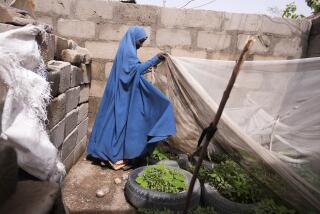North Korean families suffering as food grows scarce, U.N. says
- Share via
BEIJING — North Korea is heading toward its worst food crisis since the 1990s because of flooding, successive crop failures and worldwide inflation for staples such as rice and corn, the United Nations World Food Program said Wednesday.
The agency shied away from predicting another famine like the one that killed as many as 2 million people in the 1990s, but said its field staff was observing some of the same warning signs.
People are again foraging for wild plants, grass and seaweed to supplement their meager diets. Hospitals are reporting an increase in chronic diarrhea and illness that are often linked to malnutrition. Many families have cut back from three meals a day to two.
“We did go into the kitchens of some of these families and, believe me, there was nothing,” said Jean-Pierre de Margerie, the World Food Program’s director for North Korea, who supervised a recent study of 250 households.
When questioned about where they would get their next meal, many of the people interviewed offered vague answers, such as, “Well, I’m hoping my relatives who live on a cooperative farm will deliver some potatoes tonight.”
“One of my team members came to me and said these households were in tears. They simply didn’t have any options,” De Margerie said at a news conference in Beijing.
Under North Korea’s communist system, people living in the cities rely on a public distribution system for their staples, but the rations have been cut to one-third of their original levels. At the same time, their purchasing power has been eroded by inflation.
“We’ve noticed that market prices for staple foods in Pyongyang -- rice, maize, potatoes, eggs -- were all going through the roof, sometimes quadrupling,” De Margerie said.
To a large extent, the North Koreans are suffering as a result of the same increase in food prices that has afflicted all of Asia this year. But because their economy is so stagnant, they have no way of compensating. Making matters worse, the Chinese, who supply North Korea with much of its food, have cut back and imposed new export taxes because of concerns about their own domestic food supply. Severe floods there also affected harvests.
North Korea kicked out many aid agencies in 2005, insisting that its food crisis was over. But in May of this year, the government acknowledged that the food situation was approaching “emergency” levels and asked the World Food Program to step up its relief efforts.
The United States has also increased assistance. In late June, just days after North Korea blew up a cooling tower at its main nuclear compound, a U.S. freighter delivered 37,000 tons of wheat to be distributed through the World Food Program.
The agency is now bringing food in for an estimated 1.2 million North Koreans and it hopes in the next few months to reach as many as 6 million people, roughly a quarter of the estimated population.
De Margerie said the agency was not experiencing the same problems with access and information that complicated some of its relief efforts in North Korea in the 1990s.
--
More to Read
Sign up for Essential California
The most important California stories and recommendations in your inbox every morning.
You may occasionally receive promotional content from the Los Angeles Times.










